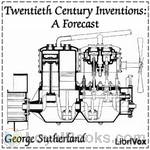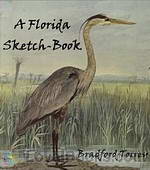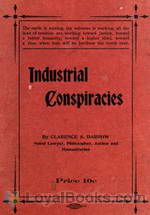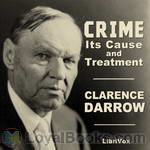|
Books Should Be Free Loyal Books Free Public Domain Audiobooks & eBook Downloads |
|
|
Books Should Be Free Loyal Books Free Public Domain Audiobooks & eBook Downloads |
|
Science |
|---|
|
Book type:
Sort by:
View by:
|
By: George Sutherland (1855-1905) | |
|---|---|
 Twentieth Century Inventions: A Forecast
Twentieth Century Inventions: A Forecast
This work from 1901 predicts what technological developments will manifest in the twentieth century. The author, a technical journalist, presents ideas for inventions and new developments in the areas of power, transportation, agriculture, mining, domestic applications, electronic devices, warfare, music, art, and news. Many have come to pass. All of them provide an interesting look into how the next century was imagined and what challenges were anticipated for the progress of society. - | |
By: Cleveland Moffett (1863-1926) | |
|---|---|
 The Conquest of America A Romance of Disaster and Victory: U.S.A., 1921 A.D.
The Conquest of America A Romance of Disaster and Victory: U.S.A., 1921 A.D.
| |
 Possessed
Possessed
| |
By: Charles Boutell (1812-1877) | |
|---|---|
 The Handbook to English Heraldry
The Handbook to English Heraldry
| |
By: Bradford Torrey (1843-1912) | |
|---|---|
 A Florida Sketch-Book
A Florida Sketch-Book
This is a series of late-19th Century essays about Florida’s flora & fauna written by a Massachusetts-based naturalist. | |
 Birds in the Bush
Birds in the Bush
| |
 The Foot-path Way
The Foot-path Way
| |
By: Maurice Maeterlinck (1862-1949) | |
|---|---|
 The Life of the Bee
The Life of the Bee
| |
 Our Friend the Dog
Our Friend the Dog
| |
By: G. E. Mitton | |
|---|---|
 The Children's Book of Stars
The Children's Book of Stars
| |
By: William Morgan (1774-1826?) | |
|---|---|
 The Mysteries of Free Masonry Containing All the Degrees of the Order Conferred in a Master's Lodge
The Mysteries of Free Masonry Containing All the Degrees of the Order Conferred in a Master's Lodge
| |
By: Ray Vaughn Pierce | |
|---|---|
 The People's Common Sense Medical Adviser
The People's Common Sense Medical Adviser
The People's Common Sense Medical Adviser In Plain English, Or, Medicine Simplified. By R.V. Pierce, M.D. INTRODUCTORY WORDS. Health and disease are physical conditions upon which pleasure and pain, success and failure, depend. Every individual gain increases public gain. Upon the health of its people is based the prosperity of a nation; by it every value is increased, every joy enhanced. Life is incomplete without the enjoyment of healthy organs and faculties, for these give rise to the delightful sensations of existence... | |
By: Clarence Darrow (1857-1938) | |
|---|---|
 Industrial Conspiracies
Industrial Conspiracies
| |
 Crime: Its Cause and Treatment
Crime: Its Cause and Treatment
Clarence Darrow was an American lawyer. He remains notable for his wit and agnosticism, which marked him as one of the most famous American lawyers and civil libertarians.In this book, Darrow expands on his lifelong contention that psychological, physical, and environmental influences—not a conscious choice between right and wrong—control human behavior. To my ears (the reader's), the author has a rather simplistic behaviourist view of human behaviour, but he argues his position with wonderful clarity... | |
By: Walter Bagehot (1826-1877) | |
|---|---|
 Physics and Politics, or, Thoughts on the application of the principles of "natural selection" and "inheritance" to political society
Physics and Politics, or, Thoughts on the application of the principles of "natural selection" and "inheritance" to political society
| |
By: Joseph Maclise | |
|---|---|
 Surgical Anatomy
Surgical Anatomy
| |
By: Fredric Brown (1906-1972) | |
|---|---|
 Earthmen Bearing Gifts
Earthmen Bearing Gifts
| |
 Two Timer
Two Timer
| |
 Keep Out
Keep Out
| |
 Hall of Mirrors
Hall of Mirrors
| |
By: John Harvey Kellogg (1852-1943) | |
|---|---|
 Plain Facts for Old and Young
Plain Facts for Old and Young
| |
 First Book in Physiology and Hygiene
First Book in Physiology and Hygiene
| |
By: Auguste Forel (1848-1931) | |
|---|---|
 The Sexual Question A Scientific, psychological, hygienic and sociological study
The Sexual Question A Scientific, psychological, hygienic and sociological study
| |
By: Orison Swett Marden (1850-1924) | |
|---|---|
 How to Succeed
How to Succeed
In this volume, Orison Swett Marden explains the road to success in simple terms for the benefit of anyone, who wishes to follow in his footsteps. Over 100 years after publication, most of these lessons are still valid today. | |
By: Howard I. Chapelle (1901-1975) | |
|---|---|
 The Pioneer Steamship Savannah: A Study for a Scale Model United States National Museum Bulletin 228, 1961, pages 61-80
The Pioneer Steamship Savannah: A Study for a Scale Model United States National Museum Bulletin 228, 1961, pages 61-80
| |
 The Migrations of an American Boat Type
The Migrations of an American Boat Type
| |
By: Frank Herbert (1920-1986) | |
|---|---|
 Old Rambling House
Old Rambling House
| |
 Operation Haystack
Operation Haystack
| |
By: Douglas Houghton Campbell (1859-1953) | |
|---|---|
 Elements of Structural and Systematic Botany For High Schools and Elementary College Courses
Elements of Structural and Systematic Botany For High Schools and Elementary College Courses
| |
By: Edward V. Lucas (1868-1938) | |
|---|---|
 The War of the Wenuses
The War of the Wenuses
| |
By: Laurence M. Janifer (1933-2002) | |
|---|---|
 Lost in Translation
Lost in Translation
| |
 The Man Who Played to Lose
The Man Who Played to Lose
| |
 Sight Gag
Sight Gag
| |
 Hex
Hex
| |
 Charley de Milo
Charley de Milo
| |
By: Erasmus Darwin (1731-1802) | |
|---|---|
 Zoonomia, Vol. I Or, the Laws of Organic Life
Zoonomia, Vol. I Or, the Laws of Organic Life
| |
 Zoonomia, Vol. II Or, the Laws of Organic Life
Zoonomia, Vol. II Or, the Laws of Organic Life
| |
By: Patanjali | |
|---|---|
 The Yoga Sutras of Patanjali
The Yoga Sutras of Patanjali
Yoga sutras by Patanjali is a seminal work in yoga, this book is more about control of mind and the true goal of yoga. The sutras are extremely brief, and the translation in neat English makes it very easy for people to understand the ancient Sanskrit text. It starts with the birth and growth of spiritual man through the control of mind. In all, this is a "all in one" book for yoga philosophy written by the master himself. | |
By: Harold L. Goodwin (1914-1990) | |
|---|---|
 Rip Foster Rides the Gray Planet
Rip Foster Rides the Gray Planet
"Foster, Lieutenant, R. I. P.," blared the voice horn, and five minutes later Rip Foster was off into space on an assignment more exciting than any he had ever imagined. He could hardly believe his ears. Could a green young Planeteer, just through his training, possibly carry out orders like these? Sunny space, what a trick it would be! From the moment Rip boards the space ship Scorpius there is a thrill a minute. He and his nine daring Planeteers must cope with the merciless hazing of the spacemen commanding the ship, and they must outwit the desperate Connies, who threaten to plunge all of space into war... | |
 Rip Foster in Ride the Gray Planet
Rip Foster in Ride the Gray Planet
| |
By: United States. Federal Bureau of Investigation | |
|---|---|
 The Science of Fingerprints Classification and Uses
The Science of Fingerprints Classification and Uses
| |
By: Charles Alexander Eastman (1858-1939) | |
|---|---|
 Indian To-day
Indian To-day
Based in part upon the author's own observations and personal knowledge, it was the aim of the book to set forth the status and outlook of the North American Indian. He addressed issues such as Indian schools, health, government policy and agencies, and citizenship in this book. In connection with his writings, Eastman was in steady demand as a lecturer and public speaker with the purpose of interpreting his race to the present age. | |
By: Jean-Henri Fabre (1823-1915) | |
|---|---|
 Social Life in the Insect World
Social Life in the Insect World
| |
 The Wonders of Instinct Chapters in the Psychology of Insects
The Wonders of Instinct Chapters in the Psychology of Insects
| |
 Bramble-Bees and Others
Bramble-Bees and Others
| |
 The Glow-Worm and Other Beetles
The Glow-Worm and Other Beetles
| |
 Mason-Bees
Mason-Bees
This is more than a book about bees and their lives; the author talks about his cats, red ants, and insect psychology in general. Jean Henri Fabre also made waves in his native 19th Century France by insisting that girls be included in his science classes, so I dedicate this recording to certain young women who risk their lives or even the less important attentions of boys simply to learn. | |
 Life of the Fly, With Which are Interspersed Some Chapters of Autobiography
Life of the Fly, With Which are Interspersed Some Chapters of Autobiography
The title tells all, along with other observations on insect life from the famed accidental entomologist of 19th Century France.. | |
 More Hunting Wasps
More Hunting Wasps
| |
By: Elinor Glyn (1864-1943) | |
|---|---|
 Three Things
Three Things
| |
By: Camille Flammarion (1842-1925) | |
|---|---|
 Astronomy for Amateurs
Astronomy for Amateurs
| |